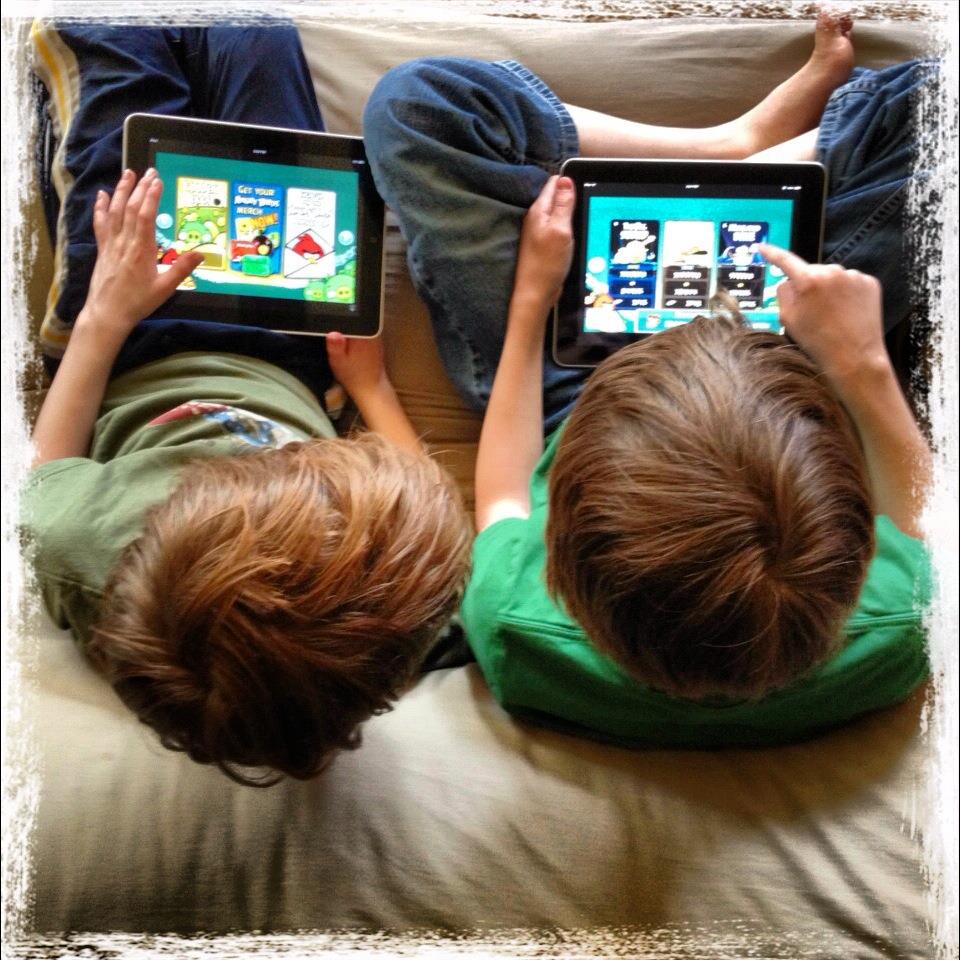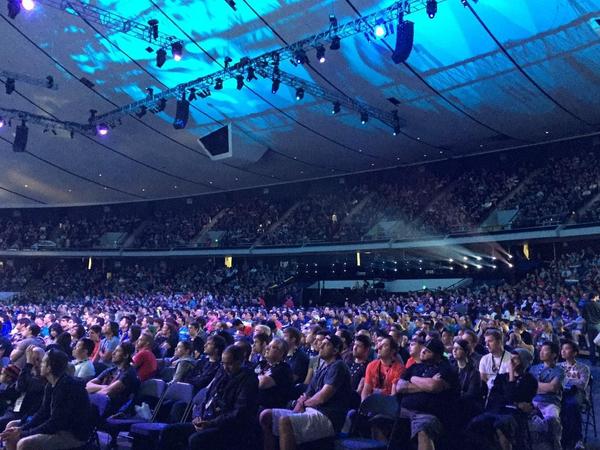
Photo by Karen James

Books, articles and commentary about the present and future of learning, and the value of videogames.
Karen James, December 2013:
Video gaming is so much more than most people see when they are standing on the outside, looking through the window they call "screen time." I would encourage you to read a little about it. I have some favourite books I could recommend. They are not by unschoolers, but they have valuable perspectives on video games and learning nonetheless:* Note from Sandra: A list of learning principles pulled from that third book and listed on someone's university webpage: Learning PrinciplesReality is Broken by Jane McGonigalMost of these authors have videos you can watch on YouTube or TED too.
Don't Bother Me Mom - I'm Learning by Marc Prensky
What Video Games Have to Teach Us about Learning and Literacy by James Paul Gee*
I can tell you that in our home playing video games has enriched our lives in more ways than I can list. I do not see video games as a prerequisite. I do see them as invaluable tools for any child who is motivated to learn through playing games. I don't think music or books are prerequisites either, but I wouldn't want to limit access to either of those for similar reasons. 
Photo by Karen James—Karen James

Photo by Karen James
I knew of such panic about 20th century waves of communication—comic books, TV, paperback books, radio—but it was fun to know that it was a more ancient reaction to any changes in the way people obtain information, and communicate.
James Paul Gee talks about the future of Learning:Pretty powerful pro gaming and learning by very respected professors. If you think you should not introduce video games watch this.
Video Games, Learning, and Literacyand Constance Steinkuehler talks about Creating Powerful Learning Environments:
http://www.youtube.com/watch?v=EpYa33mai4c
Unschoolers have been saying this for a long time!
Alex Polikowsky
Karen James, responding to this, about a boy who left school in his mid teens, November 2014:
Years after Alex wrote, I have replaced her James Paul Gee with a shorter, clearer one because the sound isn't great on this one. It's hard to listen, but here's the one she had found first: http://www.youtube.com/watch?v=aDuXD-riRH8
I wish he hadn't said "addicted." Here is what some unschooling writers I respect have to say about using "addiction" about hobbies or interests: SandraDodd.com/addiction
His fear for himself is that he will not actually do anything, but rather will sit around and play video games all day long. I know we are supposed to trust the child and the method, but I do think his concern is a valid one, given his history of not putting much effort into things.Gaming takes a lot of effort. A person who doesn't want to put effort into things, wouldn't be at all interested in playing video games. Video games are for people who really enjoy solving challenging problems, putting to use their out-of-the-box thinking and long term focus to help them achieve their goals. People don't seem to appreciate that.
One afternoon I was chatting with a gentleman who is currently working in computer vision. He is such a sweet man, and brilliant. He has changed the way we search and categorize photos online. We were talking about how much Ethan enjoys video games. I have historically assumed that people in the computer science field would embrace game play, but that is most often not the case, and this was one of those times. After sharing a bit of my son's enthusiasm, this man looked down at the ground and told us that he was ashamed because he used to play video games too much. He said he wasted a lot of time. I was gobsmacked. I looked under at him to make eye contact again and I asked him if he really thought it was time wasted, or if he had ever considered it was time invested, contributing in a real and meaningful way to who he is today. He literally was tongue-tied, seemingly never having thought this before, and quietly asked himself aloud could it be possible that playing all those games had contributed to his current success. He answered his own question in the negative, but I could see the wheels working for some time after that.
There are several successful people who do, however, see their game playing as a strong contributing factor in their success. Eric Demaine (erikdemaine.org) is a professor at MIT. He openly talks about how important video games were in his early years. He programmed his first game at age eight.
John Carmack is currently CTO of Oculus. My husband recently visited with him. He too celebrates his in-depth love of gaming. He was lead programmer on games such as Doom, Quake and Castle Wolfenstein—games my husband and I played hours of together when we were younger. Mr Carmack is known for giving fascinating talks without having prepared a thing in advance. You might enjoy googling him.
Doug, my husband, who currently works as a professor at Cornel University in the computer science department, played hours and hours of games, starting with the board game Risk, following with nearly every Atari game ever made, then followed by a series of PC first player shooter games. Currently, he plays Starcraft 2. He will still play for hours when he can. He loves playing. It helps him unwind as well as keeps his mind sharp. Recently Doug taught a lecture in his introduction to computer science class, where he used Starcraft 2 as an example he was hoping the students could relate to. He said it was humourous to see the faces of the students before him—a room of 400 bodies. A few even took pictures of him talking in front of his slides because (I assume) they were so surprised a professor was using a video game to illustrate the material they were learning. And, he knew his game, so that was even more impressive! 😊
Help your son see all of the positive and wonderful things he is doing and achieving when he plays a game. First, you will need to learn see it. There are a couple books you could read.
Don't Bother Me Mom, I'm Learning by Marc Prensky is a good one.
What Video Games Have to Teach Us About Learning and Literacy by James Gee
For fun, you and your son might like to check out a book called "Ready Player One" by Ernest Cline. The whole plot revolves around celebrating video games and pop culture. Doug is reading it aloud to Ethan and me. We're nearly done, and it has been so fun! There is some mature language and themes, but it should be good for a boy your son's age. Ethan, who is eleven, is enjoying it very much.
Another book you both might enjoy is Bad for You -- Exposing the War on Fun.
Most of all, choose to have fun! Fear will hold you back. Guilt and shame will set in to cloud thinking and stunt progress. Having the courage to have fun in whatever pursuit thrills you most will most likely lead you to places you never expected to go.
Karen James
Doug said something else that was really interesting to me that I thought might be interesting to others here.
He showed me this picture from the event:

There were 9000 people in attendance watching two Korean kids play the video game Starcraft for a $100,000. prize. Doug said that Korean kids dominate the game of Starcraft in expertise Worldwide. The reason for that is that parents fully support their children's gaming. Society encourages gaming. It's seen as a sport, and a prestigious one at that.
I thought that it was really interesting that a shift in focus (from seeing gaming as a waste of time to seeing it as a respected sport) can lead to an obvious advantage. I think that same advantage, in whatever form it takes, can happen in a home too, in big and modest ways, but all of them meaningful and crucial to a happy life.
Karen
(original on Always Learning, here)
 Screentime
Screentime
 Violence
Violence

All the photos are by Karen James except the crowd at Blizzcon.